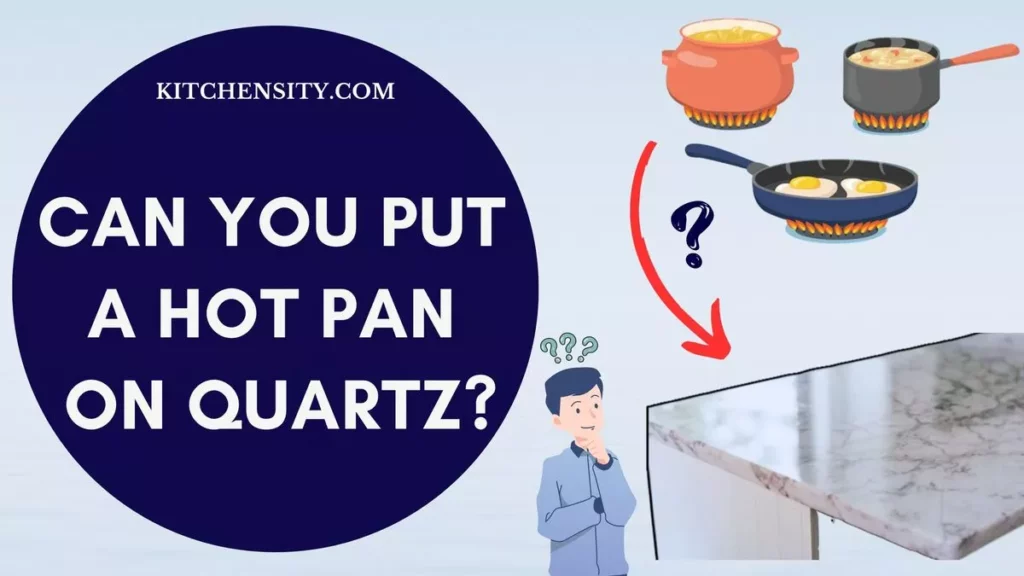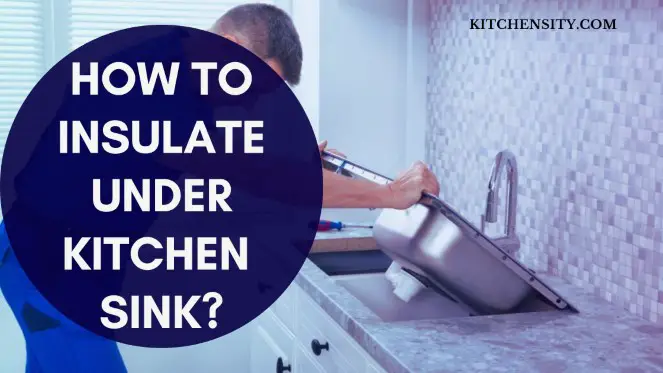In the world of kitchen design and functionality, the choice of countertop material holds significant importance. Among the various options available, quartz has emerged as a popular and stylish choice.
However, a common question that often arises is whether it’s safe to place a hot pan directly on a quartz countertop.
In this exploration, we delve into the characteristics of quartz, its resistance to heat, and the potential implications of placing hot cookware on its surface.
By gaining insights into this dynamic, we aim to help you make informed decisions that balance both practicality and aesthetics in your culinary space.

Table of Contents
- 1 Can You Put A Hot Pan On Quartz?
- 2 Understanding Quartz Countertops
- 3 What Happens If You Put A Hot Pan On Quartz?
- 4 How Do You Remove Hot Pan Marks From Quartz?
- 5 Preventing Heat Damage To Your Quartz Countertop
- 6 Cleaning And Maintenance
- 7 Sealing And Polishing Quartz Countertops
- 8 Comparing Quartz With Other Countertop Materials
- 9 Final Verdict
- 10 FAQs
- 10.1 Can You Put A Hot Cup Of Coffee On Quartz?
- 10.2 Can You Put Hot Items Directly On Quartz?
- 10.3 Can Quartz Countertops Withstand Hot Pots And Pans?
- 10.4 What Is Thermal Shock?
- 10.5 Do Quartz Countertops Require Sealing?
- 10.6 Can I Use Abrasive Cleaners On Quartz?
- 10.7 How Do I Remove Stains From Quartz?
Can You Put A Hot Pan On Quartz?
Placing a hot pan directly on quartz countertops can potentially cause problems like thermal shock, resin damage, and discoloration. To keep your quartz looking great, it’s recommended to use trivets or hot pads as a barrier between the hot pan and the surface.
Also Read – Can You Put Hot Pans On Granite Countertops?
Understanding Quartz Countertops
Quartz countertops are renowned for their exceptional durability and strength. The manufacturing process involves combining around 90-95% crushed natural quartz with polymer resins, resulting in a non-porous and dense surface. This engineered composition makes quartz highly resistant to stains, scratches, and impacts.
Heat Resistance Of Quartz
Quartz countertops are designed to withstand moderately high temperatures. Here’s a clear breakdown of what you should understand about the heat resistance of quartz:
- Composition Matters:
- The heat resistance of quartz countertops is attributed to their unique composition.
- These countertops are crafted by combining natural quartz crystals with polymer resins.
- This strategic fusion creates a protective barrier against high temperatures.
- Safe Threshold:
- Quartz countertops can withstand temperatures of up to 150°C (300°F) for short periods.
- This means that placing a hot pan momentarily on the surface is generally safe and won’t cause immediate damage.
- Caution With Quick Changes:
- Rapid temperature fluctuations can lead to thermal shock, even in heat-resistant quartz.
- Sudden temperature changes can stress the material, resulting in cracks.
- While quartz can handle the heat, it’s best to avoid extreme temperature swings.
- Long-Term Effects:
- Prolonged exposure to high heat levels can impact the resin component of quartz.
- Over time, the resin may degrade or change color, potentially affecting the countertop’s appearance.
- Preventive measures are key to maintaining the quartz’s visual appeal.
In a nutshell, quartz countertops offer commendable heat resistance, making them suitable for everyday cooking tasks involving moderate heat.
However, by employing simple precautions and understanding the material’s limits, you can ensure your quartz countertop remains stunning and functional for years to come.
Also Read – What Is The Effect Of Oven Cleaner On Kitchen Countertops?
What Happens If You Put A Hot Pan On Quartz?
Placing a hot pan directly on a quartz countertop can lead to various outcomes, and it’s important to understand the potential effects before making such a decision. Here’s what can happen if you put a hot pan on quartz:
- Thermal Shock:
- Quartz is not invulnerable to sudden temperature changes.
- When a hot pan comes into contact with a cool quartz surface, the rapid shift in temperature can cause thermal shock.
- This can lead to cracks or fractures in the countertop, compromising its structural integrity.
- Resin Impact:
- While quartz is heat-resistant, the resin that binds the quartz crystals might not be as resilient to extreme heat.
- Prolonged exposure to high temperatures can cause the resin to degrade or discolor over time, affecting the countertop’s appearance.
- Color Changes:
- Intense heat can potentially alter the color of your quartz countertop.
- This is particularly true for lighter-colored quartz, which may show discoloration or fading if exposed to excessive heat.
- This color change can be permanent and challenging to rectify.
- Aesthetic Degradation:
- Quartz countertops are often chosen for their stunning appearance.
- Placing hot pans directly on the surface can lead to unsightly burn marks or scorching, detracting from the countertop’s visual appeal.
- Long-Term Consequences:
- While immediate damage might not be evident, the long-term consequences of placing hot pans on quartz can accumulate.
- Small cracks, discoloration, or other damage caused by heat can worsen over time, leading to costly repairs or even countertop replacement.
- Warranty Considerations:
- Many quartz manufacturers have specific guidelines regarding heat resistance.
- Placing hot pans on the countertop might void your warranty, leaving you responsible for any repairs or replacements that become necessary.
While quartz is designed to withstand moderate heat, it’s advisable to err on the side of caution. To preserve your quartz countertop’s longevity and aesthetic appeal, always use protective measures such as trivets or hot pads when placing hot pans or cookware on its surface.
By taking these precautions, you can avoid potential risks and ensure that your quartz countertop remains a beautiful and functional focal point in your kitchen.
Also Read – Can I Put An Air Fryer On The Countertop?
How Do You Remove Hot Pan Marks From Quartz?
Accidentally placing a hot pan on your quartz countertop can leave unsightly marks or scorchings. Fortunately, there are effective methods to remove these marks and restore the beauty of your quartz surface.
Here’s a step-by-step guide to help you tackle hot pan marks:
- Gather Your Supplies:
- A soft cloth or microfiber towel
- Baking soda
- Hydrogen peroxide (3% concentration)
- Water
- Plastic scraper or credit card (for stubborn marks)
- Mild dish soap
- Check The Severity: Assess the extent of the hot pan marks. If they are minor and only affect the surface, you can likely address them at home. For more severe damage, consider seeking professional assistance.
- Create A Cleaning Paste: Mix a small amount of baking soda with water to form a thick paste. Baking soda is mildly abrasive and can help lift surface stains without scratching the quartz.
- Apply The Paste: Gently spread the baking soda paste over the hot pan marks. Use a soft cloth to rub the paste into the marks using circular motions. Avoid using excessive pressure to prevent scratching.
- Let It Sit: Allow the baking soda paste to sit on the marks for about 15-20 minutes. This gives the paste time to work on lifting the stains.
- Gentle Scrubbing: Using a soft cloth or sponge, gently scrub the marked area in circular motions. The baking soda paste should help lift the discoloration. If needed, use a plastic scraper or credit card to carefully remove stubborn marks, but be cautious not to scratch the surface.
- Rinse And Inspect: Thoroughly rinse the area with water to remove any residue from the baking soda paste. Pat the surface dry with a clean cloth. Inspect the area to see if the marks have been successfully removed.
- Persistent Stains: For persistent marks, you can create a cleaning solution by mixing equal parts of hydrogen peroxide and water. Dampen a cloth with the solution and gently scrub the marks. Rinse and dry afterward.
- Cleaning And Drying: Finish by wiping down the entire countertop with a mixture of mild dish soap and warm water. This ensures a consistent appearance across the surface. Dry the countertop thoroughly.
- Preventive Measures: To avoid future hot pan marks, always use trivets, hot pads, or heat-resistant barriers when placing hot cookware on your quartz countertop.
Remember that prevention is key to maintaining the beauty of your quartz countertop. However, if hot pan marks do occur, these methods can help you address them and restore your countertop’s appeal. If the marks are extensive or challenging to remove, consider seeking professional assistance to ensure the best results.
Also Read – How To Perfectly Use A Chafing Dish?
Preventing Heat Damage To Your Quartz Countertop
Protecting your quartz countertop from heat damage is essential to maintaining its beauty and functionality. Here are some effective strategies to prevent heat-related issues:
- Use Protective Barriers: Always use trivets, hot pads, or heat-resistant mats when placing hot pans, pots, or cookware on your quartz countertop. These barriers create a buffer between the hot surface and the quartz, minimizing the risk of thermal shock and damage.
- Plan Ahead: Before you start cooking, ensure you have a designated space for hot cookware. Prepare your trivets or hot pads in advance to make them a seamless part of your cooking routine.
- Keep Hot Items Elevated: When setting down hot items, make sure they are elevated slightly above the countertop’s surface. This small gap allows air circulation and prevents direct contact between the hot cookware and the quartz.
- Avoid Sudden Temperature Changes: Allow hot pans to cool slightly before placing them on the countertop. Gradual temperature changes reduce the likelihood of thermal shock and cracks in the quartz.
- Educate Family Members: Teach everyone in your household about the importance of using protective barriers when placing hot items on the countertop. This collective effort ensures the longevity of your quartz surface.
- Be Mindful Of Cooktops: If your quartz countertop is adjacent to a cooktop, be cautious when removing hot pots or pans. Accidentally sliding or dropping hot cookware can cause immediate damage or increase the risk of future cracks.
- Invest In Quality Trivets: Choose trivets and hot pads that are specifically designed for high-temperature resistance. Look for materials like silicone, cork, or wood, which provide effective protection for your quartz countertop.
- Regular Maintenance: Regularly inspect your trivets and hot pads for any signs of wear or damage. Replace them as needed to ensure consistent protection for your quartz surface.
- Educate Guests: If you’re hosting gatherings or events, inform your guests about the proper use of trivets or hot pads. This simple gesture can prevent accidental damage caused by well-intentioned but unaware visitors.
- Consider A Quartz Cutting Board: To add an extra layer of protection, consider using a quartz cutting board or a heat-resistant surface for food preparation. This will ensure that even during meal prep, your quartz countertop remains safe from heat exposure.
Also Read – Why Eggs Turn Green In Aluminum Pans?
Cleaning And Maintenance
Proper cleaning and maintenance are integral to preserving the stunning appearance and longevity of your quartz countertops. Here’s a comprehensive guide to effectively cleaning and caring for your quartz surface:
- Gentle Cleaning Routine: Begin by wiping down your quartz countertop daily with a soft, damp cloth. Use a mild dish soap diluted in warm water to remove surface dirt, spills, and food residues. Avoid abrasive cleaners or scouring pads that can harm the surface.
- Prompt Spill Cleanup: Wipe up spills immediately to prevent staining or damage. Acidic substances like lemon juice, vinegar, and wine can potentially affect the shine of your quartz surface if left unattended.
- Avoid Harsh Chemicals: Steer clear of harsh chemicals, bleach, or abrasive cleaners when cleaning your quartz countertop. These substances can break down the resin binder and affect the surface’s appearance over time.
- Non-Scratching Tools: Opt for non-scratch cleaning tools like soft cloths, microfiber towels, or sponges. These materials effectively clean without scratching the surface.
- Deep Cleaning: For stubborn stains or residues, create a paste using baking soda and water. Gently scrub the affected area with a soft cloth or sponge. Rinse thoroughly and wipe dry.
- Preventive Measures: Use cutting boards or chopping blocks when working with sharp knives to avoid scratching the quartz surface. This step ensures your countertop remains flawless even after food preparation.
- Avoid Heat Exposure: While quartz is heat-resistant, it’s best to use trivets or hot pads when placing hot pans or cookware on the surface. This preventive measure prevents potential thermal shock or damage.
- Regular Polishing: While not essential, periodic polishing can enhance the shine of your quartz countertop. Use specialized quartz countertop polishers to maintain its brilliance.
- Protective Mats: Place mats or coasters under metal objects, appliances, or utensils that could potentially scratch the surface. This precaution preserves the quartz’s smooth finish.
- Long-Term Care: As the years go by, continue to follow these cleaning and maintenance practices. Consistent care will keep your quartz countertop looking as impressive as the day it was installed.
- Professional Consultation: If you’re unsure about the right cleaning products or techniques, consult the manufacturer’s guidelines or seek advice from professionals who specialize in quartz countertops.
Also Read – How To Keep Food From Sticking To Copper Pans?
Sealing And Polishing Quartz Countertops
While quartz countertops are known for their durability, they can benefit from proper care and maintenance to ensure they remain radiant for years to come. Here’s a closer look at the importance of sealing and polishing your quartz surface:
- No Sealing Required: Unlike natural stone countertops, quartz is non-porous and doesn’t require regular sealing. The resin used in its composition acts as a protective layer, preventing liquids and stains from penetrating the surface.
- Enhancing Shine: Although sealing isn’t necessary, polishing your quartz countertop can enhance its shine and luster. Specialized quartz countertop polishers are available, formulated to effectively clean and enhance the surface without damaging it.
- Choosing The Right Products: When selecting a quartz countertop polish, opt for products recommended by the manufacturer or those specifically designed for quartz surfaces. Using the wrong polish or cleaner can result in a dull appearance or residue buildup.
- Polishing Frequency: The frequency of polishing depends on factors like usage, the presence of hard water, and the overall condition of your countertop. As a general guideline, consider polishing your quartz surface every few months to maintain its brilliance.
- Polishing Technique: To polish your quartz countertop, start by cleaning the surface with mild soap and warm water. Once clean and dry, apply a small amount of the quartz polish onto a soft cloth. Gently buff the surface in circular motions, focusing on any dull areas.
- Avoid Abrasives: Avoid using abrasive scrubbers or harsh chemicals when cleaning or polishing your quartz countertop. These can wear down the protective resin layer and diminish the surface’s shine.
- Wipe Up Spills Promptly: While polishing can restore the countertop’s shine, it’s important to prevent stains from occurring in the first place. Wipe up spills promptly to avoid potential discoloration or staining.
- Regular Cleaning: Regular cleaning using a soft cloth and mild soap is essential to prevent dirt and grime from accumulating on the surface. This basic maintenance routine will complement your polishing efforts.
- Maintaining Edges: Don’t forget to pay attention to the edges of your quartz countertop. Polishing and cleaning the edges help maintain a consistent appearance across the entire surface.
- Professional Assistance: If you’re uncertain about polishing or maintaining your quartz countertop, consider seeking professional assistance. They can provide expert guidance on the right products and techniques for your specific countertop.
While sealing isn’t required for quartz countertops, polishing plays a role in enhancing their visual appeal and maintaining their elegance.
By using the right products, techniques, and regular maintenance, you can ensure that your quartz countertop remains a stunning centerpiece in your kitchen for years to come.
Also Read – Shallow Vs Deep Baking Pans
Comparing Quartz With Other Countertop Materials
Choosing the right countertop material for your kitchen involves considering various factors such as durability, aesthetics, maintenance, and heat resistance. Let’s compare quartz with other popular countertop materials to help you make an informed decision:
- Quartz Vs. Granite:
- Composition: Granite is a natural stone, while quartz is engineered with natural quartz crystals and resins.
- Heat Resistance: Granite is known for its heat resistance and can withstand high temperatures. Quartz is heat-resistant but can be sensitive to extreme heat.
- Maintenance: Granite requires periodic sealing to prevent staining, whereas quartz is non-porous and doesn’t require sealing.
- Aesthetics: Both offer a range of colors and patterns, but quartz allows for more consistent and controlled designs.
- Durability: Both are durable, but granite may be more susceptible to cracks or chips due to its natural composition.
- Quartz Vs. Marble:
- Composition: Marble is a natural stone with a distinct veined appearance, while quartz has a more uniform design.
- Heat Resistance: Marble is sensitive to heat and can be damaged by hot pots or pans. Quartz offers better heat resistance.
- Maintenance: Marble is porous and requires sealing to prevent staining. Quartz is non-porous and easier to maintain.
- Aesthetics: Marble is prized for its luxurious and unique veining, while quartz offers customizable patterns and colors.
- Durability: Quartz is generally more durable and less prone to scratches and damage compared to marble.
- Quartz Vs. Laminate:
- Composition: Laminate consists of layers of paper or fabric with a resin top layer. Quartz is an engineered stone.
- Heat Resistance: Laminate is susceptible to heat damage and can warp or discolor. Quartz is heat-resistant.
- Maintenance: Laminate is less durable and can chip, stain, or peel. Quartz is more resilient and requires minimal maintenance.
- Aesthetics: Quartz offers a more upscale appearance and a wider range of design possibilities compared to laminate.
- Durability: Quartz is significantly more durable and long-lasting compared to laminate.
- Quartz Vs. Solid Surface:
- Composition: Solid surface is a synthetic material made of acrylic or polyester. Quartz is an engineered stone.
- Heat Resistance: Solid surfaces can handle moderate heat, but quartz offers better heat resistance.
- Maintenance: Solid surface is non-porous and easy to clean. Quartz’s non-porous nature also simplifies maintenance.
- Aesthetics: Quartz offers a more natural stone-like appearance, while a solid surface allows for seamless integration of sinks and backsplashes.
- Durability: Quartz is more durable and scratch-resistant compared to solid surface materials.
Also Read – Why Kitchen Cabinets Are So Expensive?
Final Verdict
So, after looking into whether hot pans can go on quartz, here’s the deal.
Quartz countertops are strong and look great, but we need to be careful with heat. Placing a hot pan directly on them can cause problems like cracks and color changes.
But here’s the good news: by being a bit cautious, we can keep our quartz countertops awesome. Using things like trivets or hot pads can protect them from the heat and keep them looking nice.
Remember, kitchens are about making yummy food and having a cool place, and with some care, we can do both while keeping our countertops in tip-top shape.
Also Read – What To Do If The Pan Catches Fire?
FAQs
-
Can You Put A Hot Cup Of Coffee On Quartz?
Yes, you can place a hot cup of coffee on quartz, but using a coaster is advisable to prevent potential heat marks.
-
Can You Put Hot Items Directly On Quartz?
It’s generally recommended to use protective barriers like trivets for hot items on quartz countertops to avoid any damage.
-
Can Quartz Countertops Withstand Hot Pots And Pans?
Yes, but it’s recommended to use trivets or hot pads to prevent potential damage.
-
What Is Thermal Shock?
Thermal shock occurs when there is a sudden and extreme change in temperature, which can lead to cracks in quartz.
-
Do Quartz Countertops Require Sealing?
No, quartz countertops are non-porous and do not require regular sealing.
-
Can I Use Abrasive Cleaners On Quartz?
No, abrasive cleaners can damage the surface of quartz countertops. Stick to mild soap and water.
-
How Do I Remove Stains From Quartz?
Gently use a soft cloth with a mixture of warm water and mild soap to clean stains on quartz surfaces.
Katrina Smith is a seasoned expert with over 25 years of experience in all things related to cooking and the kitchen. As an avid cook and kitchen enthusiast, she is passionate about sharing her knowledge and expertise on cookware, kitchen appliances, kitchen tips, and kitchen staples.
Through her articles and reviews, Katrina aims to inspire and help others improve their cooking skills, experiment with different ingredients, and invest in quality cookware and appliances.

![How To Unclog A Sink Clogged With Coffee Grounds? [3 Effective Ways] 3 How-to-Unclog-a-Sink-Clogged-With-Coffee-Grounds](https://www.kitchensity.com/wp-content/uploads/2020/06/How-to-Unclog-a-Sink-Clogged-With-Coffee-Grounds.jpg)


![Best Insulation Under The Kitchen Sink [3 Top Insulations] 6 Best Insulation Under The Kitchen Sink](https://www.kitchensity.com/wp-content/uploads/2023/04/Best-Insulation-Under-The-Kitchen-Sink.jpg)

